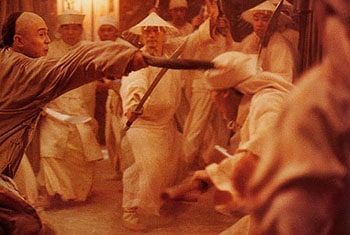I’m reviewing this now, ten years after this classic film’s original release, because even though it’s been available in good video stores for years, I only got a chance to see it as it was intended tonight. Indeed, a new 35 mm print of “Once Upon a Time In China” was screened at Montreal’s Imperial theatre as part of this year’s FantAsia film festival. It’s one thing to watch a video on a little TV screen with two or three buddies, but it’s a whole different experience to see it on a big screen, with big sound, with hundreds of fellow fanboys cheering and applauding throughout. It’s especially reinvigorating after this year’s mostly depressing crop of summer flicks. Even “Kiss of the Dragon”, Jet Li’s latest Hollywood vehicle, was so-so at best, which is bound to make you eager for some real kung fu action. “Once Upon a Time In China” is just the film to get your adrenaline pumping again.
Li stars as Wong Fei-Hong, a martial arts expert in late 19th century China who’s chosen by the Chinese government to lead a local militia to protect the land and people against potentially threatening foreigners. French, American and British ships are docked at the Canton harbour, and all the guns and canons they pack are worrying city hall. Master Wong, helped by his perky “auntie” (Rosamund Kwan) and his loyal disciples, will face danger from all sides, whether it’s those “goddamn Yankees” and their shady use of Chinese “workers”, the criminal triads who take advantage of the weak and miserable, the Chinese army itself, which is sometimes more bothersome than helpful or evil karate master Iron Robe Yim (Yee Kwan Yan), who’s determined to prove his might by belittling Fei-Hong.
As you can probably tell, the plot is sort of muddled. It can get tedious to follow who’s foe and who’s ally, as double and triple crossings multiply. Basically, Master Wong will be helped by some in one scene, then attacked by them in the next. There’s a major character named Foon whom I’m still not sure what was his motivation, as he kept switching camps. Director Tsui Hark, who co-wrote the film, is also sometimes quite radical and not very subtle in his approach. His movie sometimes feels like Chinese propaganda, as characters keep praising their national tradition and ancestral wisdom as opposed to the Westerners’ lack of virtue, cowardice, greed, lust and so on. Then again, if Hollywood movies have been using Asians and other ethnic groups as token villains for decades, you can’t really blame Hark for making a film opposing strong Chinese heroes to dirty rotten American devils.
Furthermore, in a way all the tensions and disagreements between the camps are ultimately only the set-up for some of the most exciting, hard-knocking, wildly imaginative confrontations ever put on film. “Once Upon a Time In China” is action packed and then some! If you’re used to American movies in which action scenes often add up to little more than uneven special effects, lots of noise and choppy, epileptic editing, you’re in for a real treat. Hark, working hand-in-hand with choreographer Yuen Woo-Ping, go to extreme lengths to keep the audience on their toes. A typical fight involves dozens of extras and the manual destruction of whole sets, as everyone jumps, punches and kicks at everyone and everything for ten minutes or more ! Don’t be surprised if you find yourself out of breath, hands clenched on your armchairs, staring at the screen in disbelief with a huge grin on your face.
It’s hard to put into words how badass the film is. It has to do with how Hark’s direction is dynamic without being distracting, as he’s able to hold shots long enough for us to be in awe before the performers’ physical prowess. Which is another thing : the actors are all impressive to watch. Li has magnetic presence, playing this character who inspires respect and fear to everyone he meets, and who’ll kick your ass four times before you hit the ground if you cross his path. I’m personally fonder of Jackie Chan, who’s funnier and more engaging, but on a pure punch-for-punch scale, Li is in a league of his own. You have to see him fighting all these thugs at the same time, dodging swords, breaking jaws, jumping over assailants, climbing on walls, using anything he can get his hands on as a weapon, even something as seemingly harmless as a umbrella! The film’s climactic, extended show-down between Jet Li and Yee Kwan Yan is particularly memorable. Even if you know that a lot of it is wire-work and make-believe, it’s astonishing what they manage to do with all those ladders (you’ll see!).
“Once Upon a Time In China” is not perfect in an objective critical sense, but it’s a masterpiece of the genre. While it doesn’t have the grace, lyricism and emotional resonance of a film like “Crouching Tiger, Hidden Dragon” (a movie which owes a lot to Hark and Woo-Ping’s work), it more than makes up for it with its unbridled energy, and the odd but refreshing blend of camp and melodrama of the non-action scenes adds to the overall entertainment value. Immensely worth seeking out.

